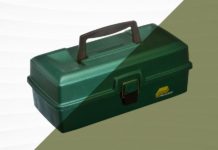DUTCH JOHN, Daggett County — Cori-Alice Holladay inspects her Clemson-orange drift boat from bow to stern. The morning sun is still climbing so her mirrored sunglasses are tucked above the bill of a ball cap. Her eyes, the only part of her face not covered by a face wrap, check every stowage compartment, fly box and boat seat. She follows a nearly spiritual routine to guide a successful — and safe — day of casting to big trout in northeast Utah.
Four fly rods secured in specially designed compartments; a mental check. Flotation vests for each angler and herself, check. A cache of #8 cicada flies she’s hand-tied for the Green River’s famous cicada hatch; check. Disinfectant, hand sanitizer and face masks; check.
As state and county safe-at-home guidelines relax in Utah, Holladay and her coworkers offer anglers a mental escape from the pandemic and a chance to catch big trout. But they’re also taking coronavirus precautions seriously.
On this Friday morning in June, Holladay preps for another day “behind the sticks,” rowing a pair of clients through postcard-perfect canyons as raptors soar overhead. She’ll scan for hungry brown and rainbow trout and dish out her advice for a good day of fishing: Keep your fly in the water.
Open water, closed doors
In March, Western Rivers Flyfisher Guides — the guide shop where Holladay works — shut down its fly-fishing charters for six weeks as Utah and the world reeled from the pandemic. Like other companies balancing employee and community health with economic disaster, the shop made the difficult decision to close its doors, hoping clients would return when the disaster passed.
Holladay says she lost 18 guide trips during that month and half.
“We don’t have a medical facility here. We don’t have a grocery store here,” she says of Dutch John. She is trained in CPR and first aid, but it’s a 45-minute helicopter ride to the nearest medical facility.
All her clients travel here from outside the county and about 60% come from outside of Utah, Holladay says. According to recent U.S. census data, more than a quarter of the population of Daggett County — where Dutch John is located — is more than 65 years old, thus more susceptible to deadly complications from the coronavirus.
Fly-fishing is already popular on the Green River, but traffic picked up during the pandemic after Wasatch County issued a public health order banning nonessential travel and visitors, shutting down the Middle and Lower Provo Rivers to out-of-county trout bums.
It could have been a lucrative spring, but Holladay doesn’t regret the decision to cancel charters. “I would hate for me to be the reason someone died,” she says. Social distancing is impossible on a small drift boat.
She also works as an adjunct biology professor at Salt Lake Community College, so she wasn’t entirely unemployed. But stepping away from her main source of income wasn’t easy.
:no_upscale()/cdn.vox-cdn.com/uploads/chorus_asset/file/20027762/boatcleaning.jpg)
Keeping the community safe
When Holladay’s clients arrive at the shop, another employee takes their temperatures. After passing inspection, they load into Holladay’s truck. She drives them three miles to the to the Flaming Gorge Dam spillway boat launch. A winter’s worth of runoff rips through the power plant below the dam, spinning turbines and providing electricity for around 50,000 homes in seven western states.
Shop owner Matt Lucas’ wife Amanda — a health care professional — took advantage of the shutdown to prepare their business to operate during the pandemic. They educated the guides and shop staff on virus transmission and how to sanitize gear. They outfitted drift boat captains with decontamination kits, gloves and sanitizer.
Now that clients are back, they’re doing all they can to keep the doors open without compromising health and safety. Each of the guides carries fish- and river-friendly hand soap. The shop is cleaned frequently, and shuttle drivers — who drive guide and client vehicles down the river from the boat launch — wear masks and gloves, shop manger Ash Lucas said in an email.
In one regard, Holladay had a head start. “I wear a mask because I can’t grow a beard,” she says. Her male colleagues can grow beards to keep the sun off their face. Holladay, the only female guide around Dutch John, wears a mask for that purpose, but now all the employees are required to wear one to prevent the spread of the coronavirus.
Since the shop reopened its doors on May 1, anglers are also asked to wear face coverings. The shop offers hand-made cloth masks for $13.
Holladay said they’ve received mixed feedback about their new precautions. Some say it’s too much. Others believe it’s not enough. “I wouldn’t tell you how to run your own boat,” she says.
“Our first priority is the safety for our clients, guides, shuttle crew and community. But, we also recognize the need to keep our doors open to continue keeping all of our guides and drivers employed to help sustain a stable economy,” Ash Lucas wrote in an email to Deseret News. “I’m sure many small business are in the same boat.”
The additional prep work required to disinfect gear, drift boat and truck have added anywhere from 30 to 45 minutes to Holladay’s day.
Utah fly fishing guide Cori-Alice Holladay nudges her drift boat into the high-flowing Green River on June 5, 2020. She was the only female guide launching from the busy spillway ramp Friday morning. pic.twitter.com/DHLb5vcoCh
— Jeff Parrott (@jefftparrott) June 9, 2020
River music
She circles the drift boat one last time, light like a boxer in her sandaled feet, then climbs aboard to the captain’s chair and begins rocking the craft off its trailer. The drift boat tips backwards and glides gently into the fast-moving Green River. The boat ramp is packed with busy guides and anxious anglers.
Her mask — sporting pictures of wildflowers and a moose — can’t hide the life she gives the heavy oars. She looks happy to be on the water. Holladay’s boss says she is one of the hardest-working and most passionate guides on the river.
“Taylor Swift got me through April,” she says, when she couldn’t be on the water. Friends, family and lots of reflection also helped in what she calls a dark month.
The music on the water this morning is less poppy. Birds sing over the buzz of cicadas, a summertime soundtrack, Mother Nature’s mixtape. Within a few short rows from the ramp, one of Holladay’s clients hooks the first trout of the morning.
When Western River Flyfisher Guides returned to business in May — a month that would typically bring only a half-dozen charters — Holladay guided 17 trips down the Green River. She’s already booked for 18-day stretch in July. And this charter in June is the first of a two-week stint.
“May clients didn’t want to talk about the virus, they just wanted to get away from pandemic stress,” Holladay says. After six years in the business, she hardly sees a new face anymore. Her past clients come back and conversations pick up where they left off.
She now uses her professional Instagram account to not only show off the monster trout her clients catch, but their mask-covered faces. Each of these photos is captioned with lyrics from a song by Taylor Swift.
But I keep cruising,
can’t stop, won’t stop moving.
It’s like I got this music in my mind,
sayin’ it’s gonna be alright.
Credit: Source link































